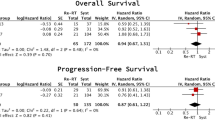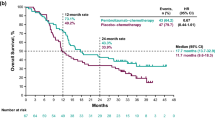Abstract
Background Improving the survival of patients diagnosed with metastatic colorectal cancer requires the use of chemotherapy to be managed with minimum adverse effects. Randomized control trials (RCTs) have shown promising results with a combination of bevacizumab and erlotinib to block two important tumor growth pathways, namely vascular endothelial growth factor and epidermal growth factor receptor. Aim of the Review We aimed to examine the efficacy and safety of the combination of bevacizumab and erlotinib with bevacizumab alone in the maintenance treatment of metastatic colorectal cancer, by examining PFS, OS, overall response rate (ORR), and toxicity. This study performed a systematic review meta-analysis using existing randomized clinical trial. Methods Randomized controlled trials were systematically reviewed from PubMed, Cochrane library, SCOPUS, CRD, and Google scholar databases. After evaluating the quality of studies through the Cochrane checklist, data of the relevant studies were extracted. This meta-analysis included outcomes of overall survival, progression-free survival of the disease through the hazard ratio, and the upper and lower confidence intervals for the third and fourth degree side effects of relative risk. To perform the meta-analysis for both types of survival, two fixed and random effect models were used. Results A total of three trials, providing data of 682 patients who received maintenance treatment, were included in this meta-analysis. Conclusion The combination of bevacizumab and erlotinib significantly increased the overall survival compared to using bevacizumab alone [HR = 0.78, 95% CI 0.66–0.93]. This combination, effectively increased progression-free survival [HR = 0.81, 95% CI 0.7–0.93] too. The side effects of diarrhea and grade III rash were more frequent in the group administered bevacizumab plus erlotinib. The combination of bevacizumab and erlotinib, in the maintenance treatment of metastatic colorectal cancer, significantly improved the overall survival and progression-free survival of patients, and the resulting side effects were easily treatable.






Similar content being viewed by others
References
Schuurhuizen CSEW, Braamse AMJ, Konings IRHM, Sprangers MAG, Ket JCF, Dekker J, et al. Does severe toxicity affect global quality of life in patients with metastatic colorectal cancer during palliative systemic treatment? A systematic review. Ann Oncol. 2017;28(3):478–86.
Tsang AH-F, Cheng K-H, Wong AS-P, Ng SS-M, Ma BB-Y, Chan CM-L, et al. Current and future molecular diagnostics in colorectal cancer and colorectal adenoma. World J Gastroenterol. 2014;20(14):3847–57.
Van Cutsem E, Cervantes A, Adam R, Sobrero A, Van Krieken JH, Aderka D, et al. ESMO consensus guidelines for the management of patients with metastatic colorectal cancer. Ann Oncol. 2016;27(8):1386–422.
Brandi G, De Lorenzo S, Nannini M, Curti S, Ottone M, Dall’Olio FG, et al. Adjuvant chemotherapy for resected colorectal cancer metastases: literature review and meta-analysis. World J Gastroenterol. 2016;22(2):519–33.
Kang KM, Hong KS, Noh GT, Oh BY, Chung SS, Lee RA, et al. Optimal time of initiating adjuvant chemotherapy after curative surgery in colorectal cancer patients. Ann Coloproctol. 2013;29(4):150–4.
Stein A, Schwenke C, Folprecht G, Arnold D. Effect of application and intensity of bevacizumab-based maintenance after induction chemotherapy with bevacizumab for metastatic colorectal cancer: a meta-analysis. Clin Colorectal Cancer. 2016;15(2):e29–39.
Esin E, Yalcin S. Maintenance strategy in metastatic colorectal cancer: a systematic review. Cancer Treat Rev. 2016;42:82–90.
Yamaguchi S, Kato S. Maintenance therapy for colorectal cancer. Gan to kagaku ryoho Cancer Chemother. 2014;41(8):932–6.
Ozcelik M, Odabas H, Ercelep O, Yuksel S, Mert A, Aydin D, et al. The efficacy and safety of capecitabine plus bevacizumab combination as first-line treatment in elderly metastatic colorectal cancer patients. Clin Transl Oncol. 2016;18(6):617–24.
Meyerhardt JA, Stuart K, Fuchs CS, Zhu AX, Earle CC, Bhargava P, et al. Phase II study of FOLFOX, bevacizumab and erlotinib as first-line therapy for patients with metastastic colorectal cancer. Ann Oncol. 2007;18(7):1185–9.
Troiani T, Napolitano S, Della Corte CM, Martini G, Martinelli E, Morgillo F, et al. Therapeutic value of EGFR inhibition in CRC and NSCLC: 15 years of clinical evidence. ESMO Open. 2016;1(5):e000088.
Kim S. Pemetrexed plus tarceva as salvage treatment in EGFR overexpressed metastatic colorectal cancer patients who were failed after standard chemotherapy. 2018. https://clinicaltrials.gov/ct2/show/NCT03086538?id=NCT00032110+OR+NCT00642746+OR+NCT03086538&rank=1&load=cart. Accessed 19 Jan 2018.
Delord J, Beale P, Van Cutsem E, Clarke S, Verslype C, Bugat R, et al. A phase 1b dose-escalation trial of erlotinib, capecitabine and oxaliplatin in metastatic colorectal cancer (MCRC) patients. J Clin Oncol. 2004;22(14_Suppl):3585.
Hidalgo M, Siu LL, Nemunaitis J, Rizzo J, Hammond LA, Takimoto C, et al. Phase I and pharmacologic study of OSI-774, an epidermal growth factor receptor tyrosine kinase inhibitor, in patients with advanced solid malignancies. J Clin Oncol. 2001;19(13):3267–79.
Keilholz U, Arnold D, Niederle N, Freier W, Porschen R, Hoehler T, et al. Erlotinib as 2nd and 3rd line monotherapy in patients with metastatic colorectal cancer. Results of a multicenter two-cohort phase II trial. J Clin Oncol. 2005;23(16_Suppl):3575.
Townsley CA, Major P, Siu LL, Dancey J, Chen E, Pond GR, et al. Phase II study of erlotinib (OSI-774) in patients with metastatic colorectal cancer. Br J Cancer. 2006;94(8):1136–43.
Erlotinib in Treating Patients With Recurrent or Metastatic Colorectal Cancer
Bozec A, Sudaka A, Fischel JL, Brunstein MC, Etienne-Grimaldi MC, Milano G. Combined effects of bevacizumab with erlotinib and irradiation: a preclinical study on a head and neck cancer orthotopic model. Br J Cancer. 2008;99(1):93–9.
Ciardiello F, Bianco R, Damiano V, Fontanini G, Caputo R, Pomatico G, et al. Antiangiogenic and antitumor activity of anti-epidermal growth factor receptor C225 monoclonal antibody in combination with vascular endothelial growth factor antisense oligonucleotide in human GEO colon cancer cells. Clin Cancer Res. 2000;6(9):3739–47.
Schicher N, Paulitschke V, Swoboda A, Kunstfeld R, Loewe R, Pilarski P, et al. Erlotinib and bevacizumab have synergistic activity against melanoma. Clin Cancer Res. 2009;15(10):3495–502.
Larsen FO, Markussen A, Nielsen D, Colville-Ebeling B, Riis LB, Jensen BV. Dual inhibition of EGFR and VEGF in heavily pretreated patients with metastatic colorectal cancer. Oncology. 2017;93(3):191–6.
Saltz LB, Lenz HJ, Kindler HL, Hochster HS, Wadler S, Hoff PM, et al. Randomized phase II trial of cetuximab, bevacizumab, and irinotecan compared with cetuximab and bevacizumab alone in irinotecan-refractory colorectal cancer: the BOND-2 study. J Clin Oncol. 2007;25(29):4557–61.
Mésange P, Bouygues A, Muller D, Savina A, Chibaudel B, Tournigand C, et al. PD-010Erlotinib attenuates bevacizumab-mediated activation of EGFR-survival signaling in CRC models independent of KRAS status providing a rational basis for the DREAM phase III clinical trial. Ann Oncol. 2015;26(suppl_4):iv103.
Messersmith WA, Jimeno A, Jacene H, Zhao M, Kulesza P, Laheru DA, et al. Phase I trial of oxaliplatin, infusional 5-fluorouracil, and leucovorin (FOLFOX4) with erlotinib and bevacizumab in colorectal cancer. Clin Colorectal Cancer. 2010;9(5):297–304.
Hagman H, Frödin J, Berglund Å, Sundberg J, Vestermark L, Albertsson M, et al. A randomized study of KRAS-guided maintenance therapy with bevacizumab, erlotinib or metronomic capecitabine after first-line induction treatment of metastatic colorectal cancer: the Nordic ACT2 trial. Ann Oncol. 2016;27(1):140–7.
Johnsson A, Hagman H, Frödin J, Berglund A, Keldsen N, Fernebro E, et al. A randomized phase III trial on maintenance treatment with bevacizumab alone or in combination with erlotinib after chemotherapy and bevacizumab in metastatic colorectal cancer: the Nordic ACT trial. Ann Oncol. 2013;24(9):2335–41.
Tournigand C, Chibaudel B, Samson B, Scheithauer W, Vernerey D, Mésange P, et al. Bevacizumab with or without erlotinib as maintenance therapy in patients with metastatic colorectal cancer (GERCOR DREAM; OPTIMOX3): a randomised, open-label, phase 3 trial. Lancet Oncol. 2015;16(15):1493–505.
Moher D, Shamseer L, Clarke M, Ghersi D, Liberati A, Petticrew M, et al. Preferred reporting items for systematic review and meta-analysis protocols (PRISMA-P) 2015 statement. Syst Rev. 2015;4(1):1.
Higgins JP, Green S. Cochrane handbook for systematic reviews of interventions. Hoboken: Wiley; 2011.
Gerber HP, Ferrara N. Pharmacology and pharmacodynamics of bevacizumab as monotherapy or in combination with cytotoxic therapy in preclinical studies. Cancer Res. 2005;65(3):671–80.
Herbst RS, Johnson DH, Mininberg E, Carbone DP, Henderson T, Kim ES, et al. Phase I/II trial evaluating the anti-vascular endothelial growth factor monoclonal antibody bevacizumab in combination with the HER-1/epidermal growth factor receptor tyrosine kinase inhibitor erlotinib for patients with recurrent non-small-cell lung cancer. J Clin Oncol. 2005;23(11):2544–55.
Tabernero J. The role of VEGF and EGFR inhibition: implications for combining anti-VEGF and anti-EGFR agents. Mol Cancer Res. 2007;5(3):203–20.
Pennell NA, Lynch TJ. Combined inhibition of the VEGFR and EGFR signaling pathways in the treatment of NSCLC. Oncologist. 2009;14(4):399–411.
Ding C, Li L, Yang T, Fan X, Wu G. Combined application of anti-VEGF and anti-EGFR attenuates the growth and angiogenesis of colorectal cancer mainly through suppressing AKT and ERK signaling in mice model. BMC Cancer. 2016;16(1):791.
Punt C, Tol J, Rodenburg C, Cats A, Creemers G, Schrama J, et al. Randomized phase III study of capecitabine, oxaliplatin, and bevacizumab with or without cetuximab in advanced colorectal cancer (ACC) the CAIRO2 study of the Dutch Colorectal Cancer Group (DCCG). J Clin Oncol. 2008;26(15_suppl):4011.
Tol J, Koopman M, Cats A, Rodenburg CJ, Creemers GJM, Schrama JG, et al. Chemotherapy, bevacizumab, and cetuximab in metastatic colorectal cancer. New Eng J Med. 2009;360(6):563–72.
Vale CL, Tierney JF, Burdett S. Can trial quality be reliably assessed from published reports of cancer trials: evaluation of risk of bias assessments in systematic reviews. BMJ (Clinical research ed). 2013;346:f1798.
Shi S, Lu K, Gao H, Sun H, Li S. Erlotinib in combination with bevacizumab and FOLFOX4 as second-line chemotherapy for patients with metastatic colorectal cancer. Am J Cancer Res. 2017;7(9):1971.
Zhang S, X-d Mao, H-t Wang, Cai F, Xu J. Efficacy and safety of bevacizumab plus erlotinib versus bevacizumab or erlotinib alone in the treatment of non-small-cell lung cancer: a systematic review and meta-analysis. BMJ Open. 2016;6(6):1–11.
Ahmadizar F, Onland-Moret NC, De Boer A, Liu G, Maitland-van der Zee AH. Efficacy and safety assessment of the addition of bevacizumab to adjuvant therapy agents in cancer patients: a systematic review and meta-analysis of randomized controlled trials. PLoS One. 2015;10(9):e0136324.
Zhao L, Wang J, Li H, Che J, Cao B. Meta-analysis comparing maintenance strategies with continuous therapy and complete chemotherapy-free interval strategies in the treatment of metastatic colorectal cancer. Oncotarget. 2016;7(22):33418–28.
Xu W, Gong Y, Kuang M, Wu P, Cao C, Chen J, et al. Survival benefit and safety of bevacizumab in combination with erlotinib as maintenance therapy in patients with metastatic colorectal cancer: a meta-analysis. Clin Drug Investig. 2017;37(2):155–65.
Deeks JJ. Issues in the selection of a summary statistic for meta-analysis of clinical trials with binary outcomes. Stat Med. 2002;21(11):1575–600.
Yada Y. Method to estimate relative risk using exposed proportion and case group data. Sci Rep. 2017;7(1):2131.
O’connor A. Interpretation of odds and risk ratios. J Vet Intern Med. 2013;27(3):600–3.
Di Fiore F, Van Cutsem E, Laurent-Puig P, Siena S, Frattini M, De Roock W, et al. Role of KRAS mutation in predicting response, progression-free survival, and overall survival in irinotecan-refractory patients treated with cetuximab plus irinotecan for a metastatic colorectal cancer: analysis of 281 individual data from published series. J Clin Oncol. 2008;26(15):4035.
Karapetis CS, Khambata-Ford S, Jonker DJ, O’Callaghan CJ, Tu D, Tebbutt NC, et al. K-ras mutations and benefit from cetuximab in advanced colorectal cancer. N Engl J Med. 2008;359(17):1757–65.
Khambata-Ford S, Garrett CR, Meropol NJ, Basik M, Harbison CT, Wu S, et al. Expression of epiregulin and amphiregulin and K-ras mutation status predict disease control in metastatic colorectal cancer patients treated with cetuximab. J Clin Oncol. 2007;25(22):3230–7.
Acknowledgments
The authors would like to thank Dr. Malek Zarei for his facilitative and collaborative efforts to this research.
Funding
This article is part of the dissertation entitled “Health technology assessment of bevacizumab compare with combination of bevacizumab with erlotinib for treatment of patients with metastatic colorectal cancer” for the Master’s Degree in Health Technology Assessment, supported by the Iran University of Medical Sciences (code: iums/shmis-1395/9311592005).
Author information
Authors and Affiliations
Corresponding author
Ethics declarations
Conflicts of interest
The authors declare that they have no conflict of interest.
Rights and permissions
About this article
Cite this article
Kaveh, S., Ebrahimi, P., Rezapour, A. et al. Bevacizumab and erlotinib versus bevacizumab for colorectal cancer treatment: systematic review and meta-analysis. Int J Clin Pharm 41, 30–41 (2019). https://doi.org/10.1007/s11096-018-0754-1
Received:
Accepted:
Published:
Issue Date:
DOI: https://doi.org/10.1007/s11096-018-0754-1




